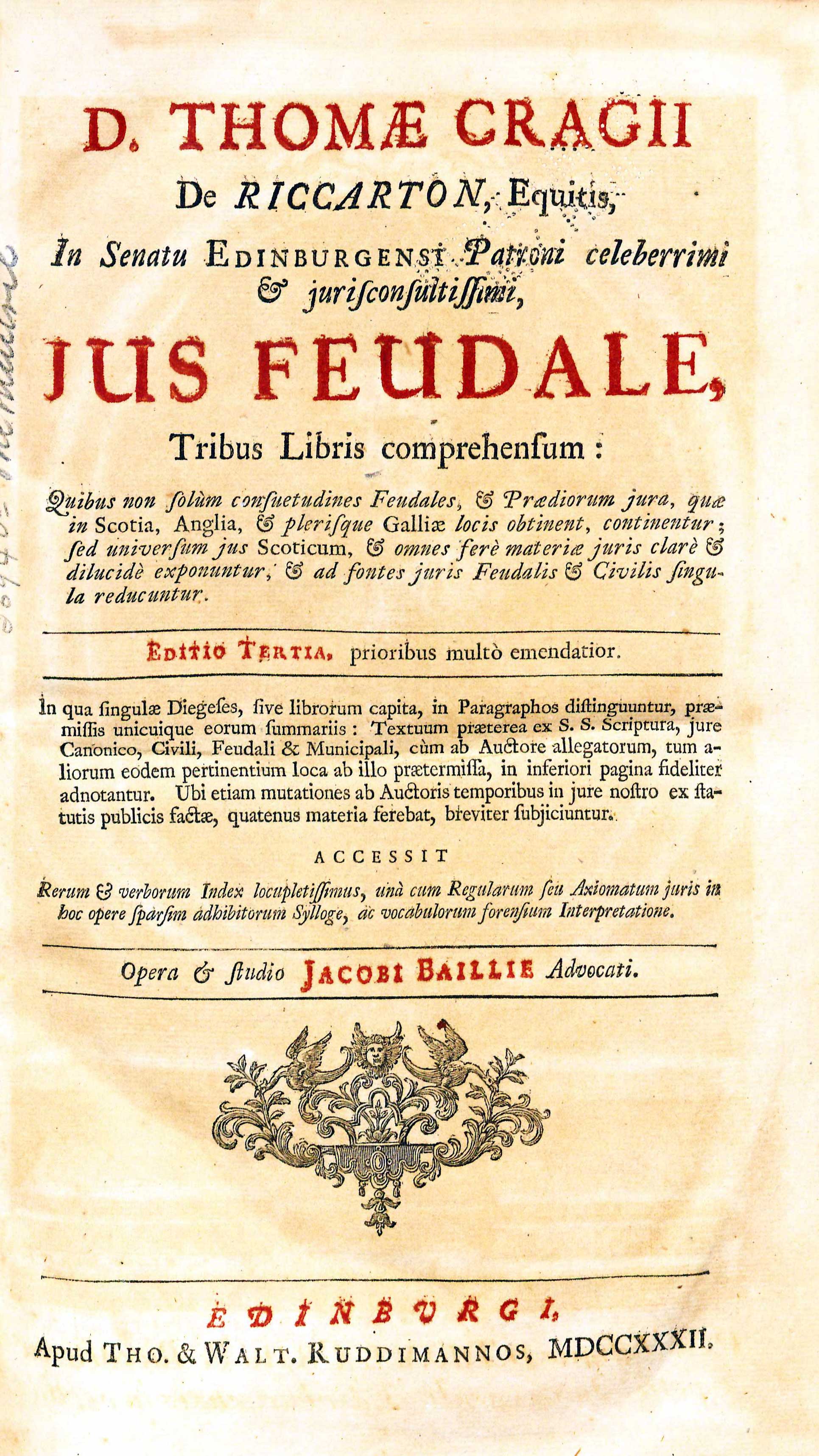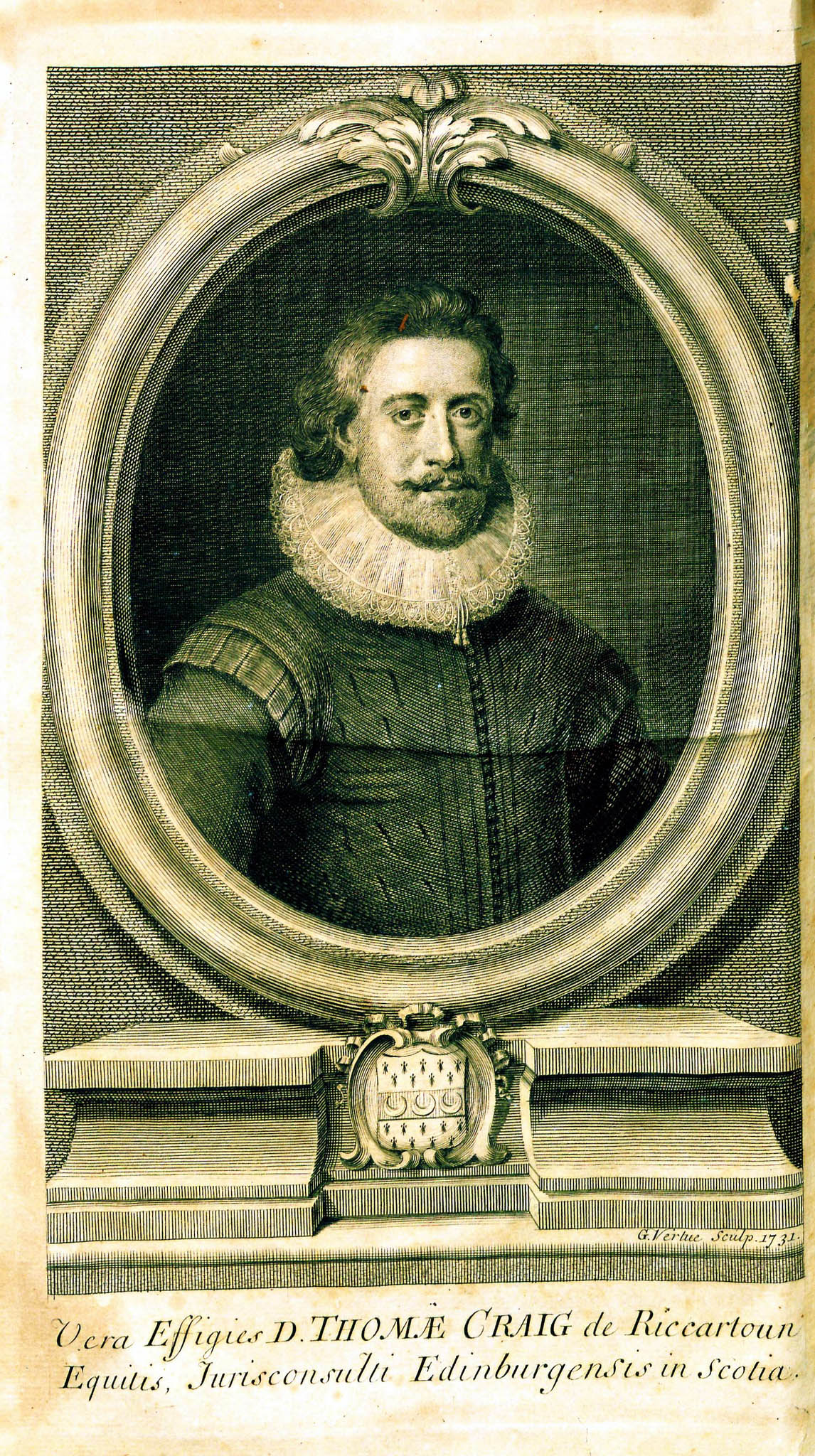Jus Feudale
by Sir Thomas Craig
| Jus Feudale: Tribus Libris Comprehensum: Quibus Non Solùm Consuetudines Feudales, & Praediorum Jura, Quae in Scotia, Anglia & Plerisque Galliae Locis Obtinent, Continentur; Sed Universum Jus Scoticum, & Omnes Ferè Materiae Juris Clarè & Dilucidè Exponuntur, & Ad Fontes Juris Feudalis & Civilis Singula Reducuntur. | |
|
Title page from Jus Feudale: Tribus Libris Comprehensum: Quibus Non Solùm Consuetudines Feudales, & Praediorum Jura, Quae in Scotia, Anglia & Plerisque Galliae Locis Obtinent, Continentur; Sed Universum Jus Scoticum, & Omnes Ferè Materiae Juris Clarè & Dilucidè Exponuntur, & Ad Fontes Juris Feudalis & Civilis Singula Reducuntur., George Wythe Collection, Wolf Law Library, College of William & Mary. | |
| Author | Sir Thomas Craig |
| Published | Edinburgi: Apud Thos. & Walt. Ruddimannos |
| Date | 1732 |
| Edition | Third |
| Language | Latin |
| Volumes | 1 volume set |
Thomas Craig (c. 1538 – February 26, 1608) was a Scottish lawyer, jurist, and poet. He studied at St. Leonard's College in St. Andrews and at the University of Paris. In 1563, he was admitted as an advocate in the courts of Scotland.[1]
[Craig] probably started work on Jus feudale in the late 1590s and there is considerable internal evidence to suggest that much of it was written in 1600. There was at least one revision, probably in 1606. The culmination of a lifetime's professional involvement in Scots law, it was enriched by frequent allusions to practice. Written in admirably clear Latin (which the poor English translation represents rather miserably), it is a typical humanistic work in its classical quotations and references and historical and philological discussions. That it originated in a patriotic concern for Scots law is revealed by Craig's stated Ciceronian aim of reducing that law to an ordered science, thereby making it easier for students to learn. He achieves this admirably, writing an accessible, learned, and well-structured work, in which he stresses the feudal origins of much Scots law (and English law too), and from that basis explains and expounds his subject in a logical fashion. He ultimately validates Scots law and its practices in the law of nature and nations in a way that to some extent anticipates Grotius. Craig gave full weight to the important late medieval commentators Bartolus and Baldus, but the principal intellectual influence on the work is French humanism, particularly the legal writings of the radical protestant François Hotman (with whose political views Craig will have disagreed strongly). Craig's systematic account of feudal land law and its principles influenced numerous later Scottish writers, and in particular Lord Stair in his Institutions, but also had an impact on English legal writers and on English understanding of the history of the common law.[2]
Bibliographic Information
Author: Sir Thomas Craig
Title: Jus Feudale: Tribus Libris Comprehensum: Quibus Non Solùm Consuetudines Feudales, & Praediorum Jura, Quae in Scotia, Anglia & Plerisque Galliae Locis Obtinent, Continentur; Sed Universum Jus Scoticum, & Omnes Ferè Materiae Juris Clarè & Dilucidè Exponuntur, & Ad Fontes Juris Feudalis & Civilis Singula Reducuntur.
Published: Edinburgi: Apud Thos. & Walt. Ruddimannos, 1732.
Edition: Third edition.
Evidence for Inclusion in Wythe's Library
Listed in the Jefferson Inventory of Wythe's Library as Cragii Jus feudale.fol. This was one of the books kept by Thomas Jefferson and later sold to the Library of Congress in 1815. The Brown Bibliography[3] includes the 1732 edition, based on Millicent Sowerby's entry in Catalogue of the Library of Thomas Jefferson,[4] while George Wythe's Library[5] on LibraryThing indicates "precise edition unknown; folio editions were published in 1655 and 1732."
Description of the Wolf Law Library's copy
Recently rebound in period style. Spine features four bands with gilt rules with green label. Purchased through the generosity of Daniel W. Baran and Lena Stratton Baran, Class of 1936. Title page punched "Biddle Library Univ. Penn." Purchased through the generosity of Daniel W. Baran and Lena Stratton Baran, Class of 1936.
View this book in William & Mary's online catalog.
References
- ↑ John W. Cairns, ‘Craig, Thomas (1538?–1608)’, Oxford Dictionary of National Biography, Oxford University Press, 2004; online ed., Jan. 2008, accessed 8 July 2013.
- ↑ Cairns.
- ↑ Bennie Brown, "The Library of George Wythe of Williamsburg and Richmond," (unpublished manuscript, May, 2012) Microsoft Word file. Earlier edition available at: https://digitalarchive.wm.edu/handle/10288/13433
- ↑ E. Millicent Sowerby, ""Catalogue of the Library of Thomas Jefferson 2nd ed. (Charlottesville: University Press of Virginia, 1983), 2:210.
- ↑ LibraryThing, s. v. "Member: George Wythe," accessed on June 27, 2013, http://www.librarything.com/profile/GeorgeWythe

